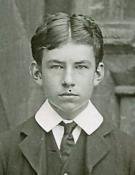
|
The King's School Canterbury |
Roll of Honour |
| Guardsman Frederick George Cleeve LONG (24753) | |
|
1st Battalion Grenadier Guards Date of birth: 14th March 1897 Date of death: 23rd October 1920 Died aged 23 Buried at Barham in Kent |

|
| He was born at Barham, near Canterbury on the 14th of March 1897, the son of Frederick Long, doctor, and Annie of The Cottage, Randwick, Stroud, Gloucestershire. He was christened at Barham on the 29th of April 1897. He was educated at Aylesbeare, Exeter, and at the King's School Canterbury from January 1912 to July 1915. On the 24th of November 1915 he enlisted at Shepherds Bush as a Guardsman in the Grenadier Guards giving his occupation as a student and was sent for training at Caterham with the 5th (Reserve) Battalion. While he was there he was hospitalised at Caterham Hospital with influenza from the 1st to the 8th of February 1916. He was posted to France on the 10th of June 1916 embarking at Southampton and joined the 7th Guards Entrenching Battalion until he was posted to the 3rd Battalion Grenadier Guards on the 29th of June. He arrived at the front on the 26th of August 1916 where he worked as a stretcher bearer. He was wounded on the 17th of September 1916 when he received a gunshot wound to the right thigh and was evacuated to the 12th General Hospital at Rouen on the 19th. He was loaded on the Hospital Ship "Lanfranc" on the 20th of September, arriving back in the UK on the following day when he was admitted to Bethnal Green Military Hospital in Cambridge Road where he stayed until the 14th of November. He was then transferred to the Convalescent Hospital at Eastbourne. He was discharged on the 2nd of January 1917 and he remained in the UK until the 3rd of April 1917 when he returned to France embarking at Southampton and being posted once more to the 7th Guards Entrenching Battalion before being posted back to the 3rd Battalion on the 27th of May. On the 3rd of August he was admitted to the 4th Field Ambulance with a case of scabies, on the 13th he was admitted to the 63rd Casualty Clearing Station with ulcerated feet and was transferred to the 22nd General Hospital on the 15th. He was placed aboard the Hospital Ship "Newhaven" on the 25th of September and taken to the 2nd Western General Hospital in Manchester. He was released on the 24th of November 1917 to Shoreham to convalesce returning to fitness on the 25th of February 1918. On the 31st of March he embarked at Southampton arriving the following day in France where he proceeded to the Guards Depot before rejoining the 3rd Battalion on the 3rd of April. On the 12th of September 1918 he was taken to the 3rd Field Ambulance and on the 14th of September he was evacuated to the 25th General Hospital at Etaples and on the 16th he was moved to the 26th General Hospital at Hardelot. He was evacuated from France on the 7th of October 1918 returning to the UK the following day and being sent to the Heavy Woollen District Military Hospital in Dewsbury with ulcerated legs arms and face. Although he was discharged from hospital on the 16th of November 1918 he never fully recovered from its affects and on the 29th of January 1919 he transferred to Class B Army Reserve and was finally discharged as being unfit for military service due to tuberculosis on the right lung on the 1st of July 1920. He died of consumption at Dr Gough's residence in Northwich on the 23rd of October 1920. He was buried at Barham on the 26th of October but the grave is no longer marked. He is, however, remembered on the Barham War memorial in the entrance of the church. |
|
Back